Nowhere was the relief over Scotland’s decision last week to remain part of the United Kingdom more acutely felt than with those responsible for Britain’s nuclear deterrent system, Trident.
The Scottish National Party had promised that independence would lead to the removal of Trident submarines and the associated nuclear warhead storage facilities from their bases on the Clyde estuary, not far from Glasgow. Irrespective of various Ministry of Defence contingency plans, it would have been very difficult if not impossible to relocate them. Consequently, a vote for Scottish independence could also have been a vote for UK unilateral nuclear disarmament.
Crisis averted?
The UK is presently in the process of replacing the Trident system. While last year’s Trident Alternatives Review, conducted at the behest of the Liberal Democrats, pointed to other reduced nuclear options, a replacement will almost certainly involve like-for-like replacement of the current four-boat submarine force.
As a result, should the successor to Trident programme be given the “green light” after next years’ general election (which seems probable), the first of a new generation of nuclear-armed submarines will be deployed by around 2030 – and Britain will retain a highly sophisticated nuclear weapons capability with global reach well into the second half of the 21st century.
Put bluntly, that means the UK will always have a submarine somewhere at sea and ready to fire its long-range nuclear armed missiles at short notice.
Since work on the new submarines will not start until 2016 at the earliest, a Yes vote might have sunk these plans before they had even begun. It would also have forced the UK government to look long and hard at the nuclear issue, and would have propelled the question right into the heart of public debate.
Instead, at a crucial moment, the No vote has papered over the cracks that are starting to appear in the nuclear rationale. The Scottish result is therefore an important victory for those committed to making sure the UK has an independent nuclear deterrent for decades to come – and a missed opportunity for those opposed to it.
Eve of destruction
The argument that nuclear weapons are an insurance against an uncertain future remains seductive, but it’s undeniably less persuasive than it was during the Cold War.
Even with eight states (nine including Israel) still nuclear-armed and the global non-proliferation effort fraying, the logic of existential deterrence that birthed Trident in the first place has unquestionably weakened: the biggest dangers the UK is now facing appears to be asymmetric threats from cross-border groups such as Islamic State, not an ideological bloc of belligerent nuclear-armed states.
And because the need for the deterrent is no longer a given, a relocation from Scotland would have forced planners and officials to make the case for spending a colossal sum of money on it; far less will be required for mere replacement.
But even more importantly, the UK government would have had to give considerable thought to what the country’s future deterrence requirements actually are. That would mean answering difficult questions about who, exactly, needs to be deterred – and whether nuclear weapons still in fact serve this function as they have in the past.
The new normal
International pressure against nuclear weapons has grown considerably in recent years, particularly since Barack Obama’s Prague Speech in 2009 and his ensuing receipt of the Nobel Peace Prize. All this has greatly strengthened the notion of an international taboo against the use of nuclear weapons.
And given the rapid development of hi-tech modern military systems and capabilities (such as drones, precision-guided weapons and cyber weapons) that may one day finally end the centrality of nuclear forces, the long-term rationale for, and utility of, the UK nuclear deterrent are both becoming increasingly blurred.
These dynamics will be particularly acute for Britain, given its small nuclear stockpile and strong domestic anti-nuclear history. But while there will certainly be much debate surrounding the final “main gate” decision now scheduled for 2016, it will never be as heated and critical as the furore that would have been generated by the relocation of the entire UK nuclear weapons complex. That in turn makes it all the more likely the decision will be waved through in two year’s time.
As a result, we may well come to look back on the Scottish independence referendum as the moment when the UK missed a chance to have an open and productive debate about its relationship with nuclear weapons – and instead it has all but guaranteed itself a nuclear-armed 21st century.

